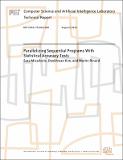Parallelizing Sequential Programs With Statistical Accuracy Tests
Author(s)
Misailovic, Sasa; Kim, Deokhwan; Rinard, Martin
DownloadMIT-CSAIL-TR-2010-038.pdf (1.261Mb)
Other Contributors
Computer Architecture
Advisor
Martin Rinard
Metadata
Show full item recordAbstract
We present QuickStep, a novel system for parallelizing sequential programs. QuickStep deploys a set of parallelization transformations that together induce a search space of candidate parallel programs. Given a sequential program, representative inputs, and an accuracy requirement, QuickStep uses performance measurements, profiling information, and statistical accuracy tests on the outputs of candidate parallel programs to guide its search for a parallelizationthat maximizes performance while preserving acceptable accuracy. When the search completes, QuickStep produces an interactive report that summarizes the applied parallelization transformations, performance, and accuracy results for the automatically generated candidate parallel programs. In our envisioned usage scenarios, the developer examines this report to evaluate the acceptability of the final parallelization and to obtain insight into how the original sequential program responds to different parallelization strategies. Itis also possible for the developer (or even a user of the program who has no software development expertise whatsoever) to simply use the best parallelization out of the box without examining the report or further investigating the parallelization. Results from our benchmark set of applications show that QuickStep can automatically generate accurate and efficient parallel programs---the automatically generated parallel versions of five of our six benchmark applications run between 5.0 and 7.7 times faster on 8 cores than the original sequential versions. Moreover, a comparison with the Intel icc compiler highlights how QuickStep can effectively parallelize applications with features (such as the use of modern object-oriented programming constructs or desirable parallelizations with infrequent but acceptable data races) that place them inherently beyond the reach of standard approaches.
Date issued
2010-08-05Series/Report no.
MIT-CSAIL-TR-2010-038